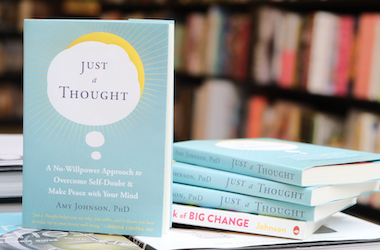I’m a major list maker. I love the clarity that comes from getting thoughts out of my head and the concreteness of  seeing them on paper. I love having the mental space to switch gears without needing a nap.
seeing them on paper. I love having the mental space to switch gears without needing a nap.
Clutter in any form robs your energy—too many thoughts bouncing around in your head is mental clutter. Making lists, journaling, and free-writing are the energetic equivalent of cleaning and organizing a really messy closet. (If you aren’t familiar with that feeling, go purge something or organize even just a small corner of your environment. You can thank me later.)
There are a lot of other benefits to writing things down, too. Like getting to create a life you choose, and not feeling stuck in inaction. You know, minor stuff like that.
So, on the off chance that you’d like more energy, clarity, and a bigger say in your life, here are 5 really good reasons to write things down.
1. Because it feels good to be clear-headed
When too many thoughts are swirling around in your head your memory and concentration go down the tubes. You’re easily stressed out and mentally exhausted. Writing things down frees up mental capacity so you can focus again.
Getting all that stuff out of your head feels kind of like telling a big secret or having a good cry. Like a weight is lifted. You’re clear. You’re lighter. Everything is easier.
2. Because you can filter and choose your thoughts
It’s much easier find your black wedge knee-high boots when you only have a few pair. It’s also easier to find them when your closet is organized.
Same with your thoughts. Filtering past the automatic, default thoughts and choosing which ones you’ll play with is actually doable when there is less overall clutter up there.
Filtering means being aware of the inventory, first. Knowing which boots you own; and being aware of which thoughts are dancing in your head.
Then, it’s choosing where to put your focus. Choosing which thoughts you’ll let pass by (hint: if it doesn’t feel good, buh-bye), and which you’ll elaborate on, try on, and talk about (the ones that feel good, I hope). Just like with your boots—the less cute ones that pinch your feet will sit in the closet. The others you’ll wear to the bar.
Writing things down makes the pool smaller and more manageable so that you’re more easily aware. It positions you to choose.
3. Because it makes it easier to take action
In your head, ideas are big, vague, and ill-defined. It’s hard to hone in and whittle them down into manageable action steps when they’re floating and fuzzy.
When you put an idea on paper you refine it. There it is in black and white: Finish Dissertation—and you naturally begin breaking it down into concrete action steps.
Then you break those steps into smaller ones, and break those into smaller ones, until you’ve gone from Finish Dissertation to 1) Finish 3 References on Page 20 2) Revise the First Paragraph of the Introduction 3) Add in Page Numbers.
Now you have something to do today.
4. Because you forget things if you don’t
Obvious. But worth reminding you, because it’s really fun to remember things you’re beginning to forget. Like what you thought after your first date with the person you ended up marrying. Or all the details of the day you gave birth.
You may be too nervous or too excited or too busy pushing a person out of you to encode all the details at the time. And your memory after the fact is colored by everything that has happened since.
Have you experienced the thrill of re-reading old journals? Although it sometimes sucks to switch gears and write things in the moment, think of it as planting surprises you’ll get to dig up later. Little baby time capsules.
The happiness that comes from reliving details is usually worth the effort of getting out your pen and paper.
5. Because it helps you to live the way you want
You know those moments of self-discovery when you stumble upon some important realization for the first time? Like realizing that asking for what you want is more effective—and easier—than expecting them to read your mind. Or noticing that when you disable your email chimes you can focus and get much more done.
Good as these discoveries feel, they aren’t your default pattern. They’re new and unpracticed, so when you’re running on auto-pilot (which, let’s face it, is most of the time for most of us), the old patterns are going to pop up. You’ve discovered a new way of being that works better, but until it’s a habit you’ll need to remind yourself to do it.
So take notes. Write down reminders of these patterns-in-training and put them everywhere to support your new habits. With written prompts you can live in creation instead of reaction.
Related Posts:





